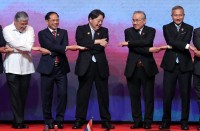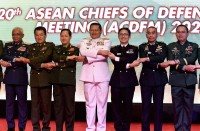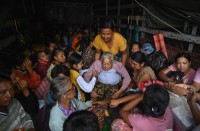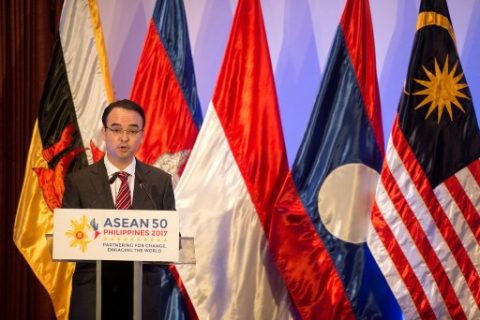
/ AFP PHOTO / POOL / NOEL CELIS
Philippine Foreign Affairs Secretary Alan Peter Cayetano said this is the best time for ASEAN member states to take the role of being partners for change as the regional bloc celebrates its 50th year.
Cayetano on Saturday, August 5, welcomed his counterparts from different member states of the Association of Southeast Asian Nations (ASEAN) as they gathered in Manila for the 50th ASEAN Foreign Ministers’ Meeting (AMM).
Senior officials and delegates from other ASEAN countries are currently in Manila to attend the Foreign Ministers’ Meeting and Related Meetings, which will be held until August 8, the exact date that ASEAN turns 50.
Secretary Cayetano led the opening ceremony of the AMM at the Philippine International Convention Center in Pasay City.
-Golden opportunity to be partners for change
In his speech, Cayetano described the event as a “golden opportunity” for the 10 member states of ASEAN to take on the role of being partners for change.
“The time is now. In the next few days, let us seize this opportunity to transform shared aspirations and values instituted by our founding fathers, no less than their dreams and visions into concrete actions and tangible outcomes that will propel our community to a brighter future our people truly deserve,” Cayetano said.
“Let us continue to partner for change and to engage and change the world,” he added.
Cayetano said the Philippines’ hosting of the ASEAN as well as the 50th anniversary celebration of the regional bloc is an opportunity for the country to bring the best in the Filipinos to honor the legacy of the ASEAN’s founding fathers and to continue enjoying the respect and trust of fellow ASEAN members and partners and the rest of the world.
He recalled how the regional bloc started and triumphed in delivering its promise of peace, stability and economic development for its peoples for the past 50 years.
Since its foundation, he said, the bloc also gave birth to several ASEAN mechanisms that play a key role today in enhancing confidence, building and promoting training and regional stability.
He said with more than 600 million people, ASEAN has a combined GDP of $2.4 trillion noting that it would be the third fastest growing economy next to China and India if it were a single economy.
Through open, inclusive and outward-looking nature, Cayetano said ASEAN has been able to develop intricate partnership with other countries outside the region including Australia, Canada, China, Japan, New Zealand, Republic of Korea, Russia, United States, the European Union and India.
It has likewise three sectoral partners such as Norway, Switzerland and Pakistan. ASEAN has one development partner in Germany and also has special relationship with the United Nations , which Cayetano said, was converted into comprehensive partnership in 2016.
“Through this system of partnership, ASEAN has been able to leverage on the strength of its partners to more effectively address issues of common concerns across three pillars of cooperation namely: political, economic and sociocultural,” he said.
-ASEAN Way: consensus building and non-interference
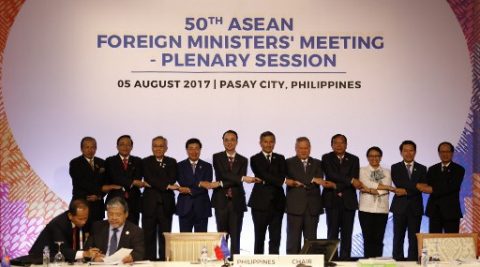
While ASEAN has become deeply involved in its external partners, Cayetano said the bloc has maintained its centrality and has continued to enjoy peace, security, “largely due to its key role as a platform for constructive dialogue, consultation and confidence building among its members and external partners.”
He said the bloc has developed what is called the “ASEAN Way,” based on the principles of dialogue, consensus and cooperation and non-interference on internal affairs of other states.
“Our commitment to this principle is the bedrock of our community’s peace, stability and shared prosperity,” he said adding that as the group charts the next 50 years, it must be guided by these values and principles and treat them as a legacy of its founding fathers.
And as the ASEAN enjoys regional unity, Cayetano hopes that it spreads beyond borders to other regions in the world.
The Secretary’s speech was followed by a special performance by Filipino singers Christian Bautista and Aicelle Santos, together with the University of the Philippines (UP) Singing Ambassadors.
Delegates and guests also witnessed the unveiling of a painting by Filipino artist Peter Paul P. Blanco, which depicts the historic signing of the ASEAN Declaration on August 8, 1967 in Bangkok, Thailand.
The said artwork is dedicated to honor and recognize the five founding fathers of ASEAN – Adam Malik of Indonesia, Narciso Ramos of the Philippines, Tun Abdul Razak of Malaysia, S. Rajaratnam of Singapore, and Thanat Khonam of Thailand – who paved the way for the association’s establishment.
The event culminated with the traditional ASEAN Family Photo and ceremonial handshake of the Foreign Ministers, along with ASEAN Secretary-General, H.E. Le Luong Minh. (with PND report)

